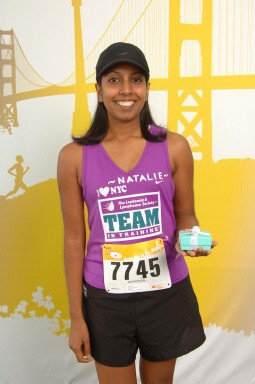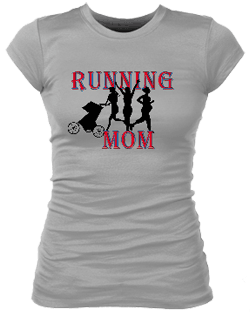Recovering from Running Injuries:
Interview with Natalie Johnson
Running injuries, Natalie has sure had her share of them, but she just keeps getting back up again. She has learned so much through her injuries and she has been generous to share it with us.
 |
Tell us a little about yourself. You’re currently going to school to become a lawyer?
I am currently in school full time, will be graduating this year with my Bachelors. I work full time as well as a legal assistant. I am preparing for the LSAT – not in Law School yet! But I’m getting there!
How does running affect your life?
Running helps me to relieve the stress that comes with work and school. When I run I’m able to visualize and think about things more clearly…..especially when I'm outside. It's my way of escaping since I'm always around people.
Does anyone else in your family run?
No. But my dad always wanted to do a marathon – every year he would say he wants to run the NYC marathon. I still think he's going to do it one year. Maybe this year I’ll sign him up for the lottery.
As a kid I only ran in gym class or playing tag, but never got into it before the NIKE Women's Marathon in San Francisco. I wasn't a sports person when I was younger.
How did you get into running?
I got a postcard in the mail from TNT and I was just moved to do it, I didn't think twice about it. I didn’t even know how long a marathon was. Eric (boyfriend) actually looked it up online and I realized it was 26.2 miles so when I went to sign up, I decided to do the half.
How long have you been running?
I've been running since 2006. I started out training for the half marathon. After training, I got a lot of confidence and thought I would be able to do the full until I got injured due to stress, so I had to drop back down to the half.
How many marathons have you completed?
I haven't run a marathon yet. I've finished five half marathons. I wanted my first marathon to be NYC.
What is your average running time for short distance? For long distance?
Long distance: 11-12 minutes / mile. Short distance: 9 ½-10 min / mile. I’m looking to speed up my pace, that's why I started to train after recovering from the running injuries.
What motivated you to keep running after the SF marathon?
I've kept in contact with girls that I've run with and met through TNT along the way. We're all different, but we have one thing in common – we love running. It's great when you meet people who share your passion.
Another thing I love about running is the way I feel after: energized, refreshed and happy. I'm always motivating someone to start running when I start talking about how great I feel after a run.
How do you fit training into your schedule?
It takes a lot of motivation. What keeps me going is thinking about how good I feel after I run. When I'm training, I follow a training plan and try to stick to it. All the other social activities get pushed to the side when I'm running.
It also helps knowing there's going be some eating after!
Before I got injured I ran with a few people in Lynbrook. There is a running store here where people of all running levels can get together. We did track work, speed intervals, and a 5-7 mile run. It's a social thing: meet, talk, stretch together and do abdominal workouts.
But when I can't meet up because of school and work, I have to find motivation within myself.
Can you tell us a little about how you got a running injuries training for the NYC marathon?
I remember it clearly because I've gone over it so many times telling people.
I ran up to 12 miles before getting a stress fracture. I thought it was shin splints so I slowed down.
The next day I remember feeling so sore and thinking it was just an after affect of running because I always felt a little pain in the front after runs. Two days later it was still hurting when I jumped on it so I decided to wait till the pain went away. A week later while I was in Virginia, I still felt pain when I jumped on it so I decided to stop until I saw my doctor.
I first went to a general doctor. I was going to run a 10K, but I wanted to get a doctor’s opinion first. The doctor advised not to run, since I was training for a marathon. He thought it could be shin splints.
The next week, I went to a Sports Medicine Doctor, who specializes in pain management. She gave me a different diagnosis. She suggested it could be a stress fracture and ordered a bone scane and x-rayes to make sure.
It’s hard to know whether to stop or keep training when it comes to running injuries. How did you know you needed to stop running and seek treatment for your running injuries?
I had the knowledge from coaches, I read Runners World about running injuries and what to look for.
The pain was more than usual. I was going up more hills than I had ever done, so I was training harder. But I was still feeling a pain I’d never felt before.
Knowing I was going to be training another three months, I didn’t want to do any more damage to my body. Better to take it easy and relax then keep going and make it worse.
Maybe I did have shin splints in the beginning, but as I continued running it developed into a stress fracture.
Did you continue to train after the running injuries?
All this happened in one training run. It was August 18th, I was running w/ Roxanne (friend). The pain was really bad towards the last 2 miles so I walked to ease the stress on my legs.
How have you learned to avoid running injuries like this in the future?
Strengthen legs and don't do too much too fast. The reason it turned out the way it did was because I increased my mileage too quickly. Although I was following a training plan, I probably didn't follow it close enough. On the weekend I increased too quickly, but I didn’t run enough during the week to build up to the long runs.
What was it like having to stop training because of running injuries when you were about to reach your goal of running a marathon?
I was really excited about running the marathon. Of course when you're in that position, when the pain’s still there you kind of think the worse. I was frustrated, thinking I can't run, I don’t want to make it worse because what if I injure myself and I can’t run again.
I think that’s one of my greatest fears, of getting running injuries to the point where I can’t ever run. I especially had this fear before when I was having knee pain.
When were you having knee pain?
I had knee pain when I was training for the NIKE Women's Marathon. It started about a month or so into my training.
How did you deal with the knee pain?
I changed my sneakers and saw a physical therapist. I would go to therapy once or twice a week and would do strengthening exercises at home to help my legs get stronger. I learned a lot about how certain exercises help to alleviate the pain and so by listening to the doctors I was able to get better. Since then I haven’t had any major knee pain while running.
Back to the stress fracture part of your running injuries, how did you get through it?
I had to talk to myself. Just being encouraged while talking to everyone else and realizing that once the healing is over, I will be able to run again. I did the right thing, going to the doctor, consulting Runners World, and resting is the only thing you can do. I did a lot of resting.
Walking also helped me. The doctor told me that walking actually helps to promote the bone growth so she suggested walking a few times a week to help the recovery process.
Once I wasn’t feeling any pain, I started doing a lot of walking and was careful not to jump on it or apply any unnecessary pressure. I also worked out at the gym on the elliptical machine – that made me feel like I was running, but without impact.
Have you run since recovering from your running injuries?
I've run, not consistently, but I ran in December a couple miles on the treadmill to get my muscles moving again. It’s like starting all over again. It’s hard to get back into running.
I decided to get into boot camp so that when I do run, I'll have less of a chance of sustaining more running injuries.
Tell us about boot camp.
This woman, her name is Rebecca Warner, is a nutritionist and a trainer, so in addition to boot camp, she guides you on the right way to eat. It was a really good experience, something I'll always remember, a change in my lifestyle.
What did you take away from boot camp?
We learned just because you're trying to loose weight in your stomach or inches off your waist, you don't just want to do crunches alone. You also want to do cardio.
We mixed it up, did kick boxing, pushups, "boot camp" exercises. In all those things your core is engaged. Even those things you do during the day work out your mid section.
What things you do during the day?
You don't need to go to the gym and use the big machines to work your base, you can use balls. 5 pound weights were all we used. Side bends worked your obliques. Leg lifts: lift to the side and back. Hamstrings: lie on the floor in the cat position and extend your leg back. Getting a chin up bar for the door will help workout the lower abs. These are really good exercises you can do at home.
Make it a routine before you go to bed or wake up in the morning, you can do 10 min of these exercises. These little things really helped.
Something else that helped was changing what I eat. I opt for more natural food than anything processed. I started paying attention to the foods with saturated fat. If it has more than 10%, I won’t even eat it……well sometimes.
It’s really hard to make the change right away. One thing to remember is to gradually make changes to your routine. Everything takes time.
If you have a sweet tooth, you can opt for fruit. Put fruit in your yogurt, apple a day, bananas in your cereal and dried cranberries in your oatmeal.
I won't drink any soda or juices with artificial coloring and things like that, drink mostly water. I don’t even drink juice. If I need soda I drink ginger ale because it has less artificial colors and no saturated fat.
One thing you mentioned was that you didn't loose much weight but you did loose inches from your waist?
I only lost one pound but I lost 2 ½ inches from my waist. My goal wasn't to loose weight, it was to loose body fat, tone up and firm up muscle. I wanted to see firming up of my body, so my waist size would go down.
People think because you’re skinny, you're healthy and that might not necessarily be true. It has to do with the percentage of body fat.
What's the significance of loosing inches vs. pounds?
I was more concerned with loosing body fat than losing weight. Losing weight just make me skinner, but my goal was to be healthier.
Your waist size increases your risk of heart disease, especially in women.
What are you future goals?
To run the marathon without any running injuries. In three-four years I want to do a triathlon (I'm taking swimming lessons).
Just trying to get myself in the best possible physical condition.
Return from Interview with NJ about Running Injuries
to Running-Mom HomePage








